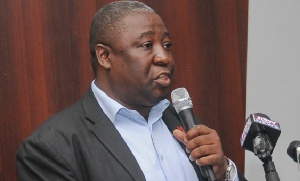 Dr Badu Sarkodie, acting Director of Public Health at the event
Dr Badu Sarkodie, acting Director of Public Health at the event
The Ghana Health Service (GHS) has engaged some senior journalists and media persons on the outbreak of COVID-19, and gave an assurance that there was no need for evacuation of Ghanaian students in Wuhan.
Referring to the World Health Organisation (WHO), the GHS said evacuation was not advisable now, but would be considered when it was necessary.
At a meeting in Accra, to brief the media on the Service’s preparedness on the disease, Dr Baffour Awuah, the Director General of the Service gave the assurance that no Ghanaian anywhere, both within or out of the country had contracted the disease, and adequate measures were put in place to secure Ghanaian students in Wuhan.
His assurance comes In the face of Mr Samuel Okudzeto Ablakwa, Ranking Member on Foreign Affairs Committee of Parliament; and Kwabena Mintah Akandoh, Ranking Member on Parliament’s Committee on Health, earlier in the week mounting pressure on the Government, and further giving it a three-day ultimatum to evacuate Ghanaian students from parts of China affected by the disease.
The Director General assured Ghanaians that Government was in constant touch with her Chinese counterpart over the safety of Ghanaian students in Wuhan, and that adequate protective measures were put in place for their safety.
He gave further assurance that the students were found not to be at risk, and to evacuate was not essential.
Also, the decision to evacuate is not that of the GHS, but a national decision.
Dr Badu Sarkodie, acting Director of Public Health, announced that Government had released GHC 2.5 million of the GHC35 million budget to tackle the disease.
However, a significant number has recovered and gone back home.
He said 2500 people that passed the country through Kotoka International Airport were screened on arrival for COVID-19, and all the 15 suspected cases tested at the Noguchi Memorial Institute for Medical Research proved negative.
Globally, more than 60,300 cases of the disease were reported, with 1368 deaths.
Dr Sarkodie said the Service would engage Parliament’s select committee on Health, chiefs and traditional elders, the religious community as well as other stakeholders on the disease.
He announced that the Service had a put in place a “robust system” to tackle the disease, with dedicated ambulances to pick suspected cases.
In Accra, the Ridge Hospital, the Police Hospital, LEKMA Hospital and Korle Bu Teaching Hospital have been designated as referral health institutions.
Following the first reports of cases of acute respiratory syndrome in the Chinese Wuhan municipality at the end of December 2019, Chinese authorities identified a novel coronavirus as the main causative agent.
The outbreak has rapidly evolved affecting other parts of China and outside the country.
Cases have now been detected in several countries in Asia, but also in Australia, Europe and North America. The first cases in the EU/EEA were confirmed in France.
Further global spread is likely.
On 12 February 2020, the novel coronavirus was named severe acute respiratory syndrome coronavirus 2 (SARS-CoV-2) while the disease associated with it is now referred to as COVID-19.
It is a new strain of coronavirus that was previously not identified in humans.
Outbreaks of novel virus infections among people are always of public health concern, especially when there’s little knowledge about the characteristics of the virus, how it spreads between people, its severity and treatment.
Human-to-human transmission has been confirmed, but more information is needed to evaluate the full extent of this mode of transmission.
The source of infection is unknown and could still be active.
This is an emerging, rapidly evolving situation with ongoing outbreak investigations and designated for the suspected cases.